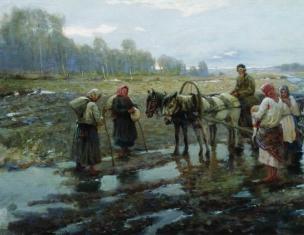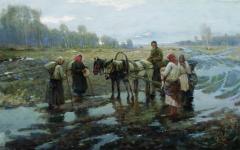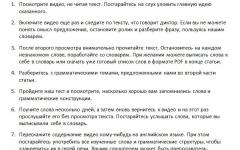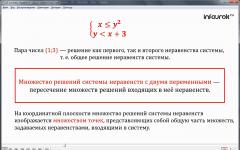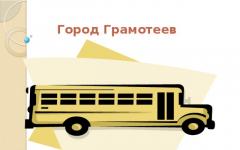“Training cannot be brought to thoroughness without the most frequent and especially skillfully performed repetitions and exercises,” said John Amos Comenius. General repetition classes have the goal of systematizing, consolidating previously acquired knowledge and acquired skills, and by organizing such classes in a playful, entertaining way, we also stimulate the desire of preschoolers to learn a foreign language. I bring to your attention one of these classes.
GAME-TRAVEL INTO SPACE
(lesson in the preparatory group)
Lesson objectives:
– To promote the development of the child’s linguistic abilities, interest, desire to communicate in English, while receiving pleasure and joy;
– activate, consolidate speech patterns, lexical units on the topics “Colors”, “Products”, “Counting”, “Seasons”; “Body parts”;
– practice listening;
– repeat poems and songs, improving diction and emotional expressiveness of speech;
– repeat and consolidate counting from 1 to 10, ability to solve examples in English.
– cultivate kindness, a sense of responsibility towards each other, towards new friends.
Equipment: a map of a journey through colorful planets, a picture or model of a spaceship, a recording of “space” music, a recording of riddles, alien greetings, images of the aliens themselves, space helmets, a letter from aliens, pictures with the seasons, a poster with food, cards with numbers , telescopes, sweet surprise.
Progress of the lesson
– Hello, children! I am glad to see you.
Guys! Have you ever traveled into space, especially in an English class? No? Don't be upset! We will go there today on this spaceship. Any journey requires a map. We have it too. Arrows show the route. This will not be an easy journey - on each planet we will find various surprises and tasks that we must complete. And they will be assessed by a jury from Earth from the mission control center using telescopes. But we can’t fly yet because we haven’t stocked up on food. Look here. What products do you know? What do you like to eat and drink?
OK? Are you ready? Count from 3 to 0! All together! 3, 2, 1, 0! Go!
(Cosmic music sounds)
First stop: Red Planet.
What color is this planet? And here is the mistress of this planet. Listen to her, please.
Starlady: Hello, friends! How are you? I am happy to welcome you on my planet. Please guess my riddles.
She also speaks English. What is she asking for?
Probably her planet is called “Guessing Game”. Let's try to guess its riddles.
- I am small, I am green, I can jump and swim. I like water. I like flies and mosquitoes.
- I am big. I am yellow and brown. I am very strong. I can run and jump. I like meat.
- I am big, I am green, I can swim, I like meat. I am angry. I have got big teeth.
- I am small, I am grey. I can run. I like cheese. I don't like cats.
- I am big and grey. I can go and run. I like apples, carrots, sugar. I have a trunk.
- I am small and brown. I can jump and climb. I am merry and sly. I like bananas and sweets.
Thank you, good-bye, friends!
Second stop: Blue Planet. (“Reread”)
What color is this planet?
For some reason no one is meeting us here, but a letter has been left.
(The letter is composed using pictures and pictograms - icons that help to correctly compose a sentence and reproduce it in English) Figure 1
Thank you, inhabitants of the Blue Planet, now we know what you are like.
Third stop: Yellow Planet.
What color is this planet?
And here are the inhabitants of this planet.
Starlady: My name is Zapevaika. Let's sing a song!
Starlady: My name is Play. Let's play!
Physical education session to the melody of the song “I’m lying in the sun.”
- Put your fingers on your nose,
- Put your fingers on your knees,
Straighten your arms shoulder-width apart, palms forward, bend over, touch your knees with your hands.
On your hair and on your cheeks,
Place your hands on your head, touch your cheeks.
On your knees, on your hair
Touch your knees with your hands, then your head.
And wave them in the air.
Straighten your arms up and wave them.
Straighten your arms shoulder-width apart, palms forward, and touch your nose with your index fingers.
On your hips and on your toes,
On your nose, on your toes,
Straighten up, touch your nose with your hands, sit down, touch your toes.
On your hips and on your toes.
Place your hands on your belt, squat, touch your toes.
Game “Fishing”.
Two catchers are selected from among the children. They hold the “fishing net” - a large headscarf - by the ends and raise their hands up. Fish swim under the net - the rest of the children. Everyone says the rhyme in unison:
Fish is tasty,
Fish is fat
Fish is here –
In my net.
At the end of the rhyme, the “catchers” cover the child who is running between them with a scarf. The caught player replaces one of the drivers. The game continues.
Fourth stop: Many-Coloured Planet.
What color is this planet? What colors do you see here?
On this planet we must remember the seasons - seasons and poems about them.
(based on the paintings, children remember the seasons and recite poems)
- Spring is green.
Summer is bright.
Autumn is yellow.
Winter is white - The snow is falling,
The wind is blowing,
The ground is white
All day and night. - In spring, in spring
Fresh and sweet is everything.
Rain, rain, go away,
Come again another day
All the children want to play. - Summer time
Is a time for play.
We are happy
All the day.
Sun is shining
All day long
Trees are full of birds and song. - Summer is here.
The brooks running clear
For summer is here,
Yes, summer is here. - Yellow, red, green and brown
Look, the little leaves fall down.
Dancing, dancing in the breeze.
Falling, falling from the trees. - The summer is over,
The trees are all bare,
The mist in the garden
And frost in the air. - Winter brings us snowflakes.
Spring – green buds and shoots.
Summer brings us berries,
Autumn golden fruits.
Stop five – Orange Planet.
(The numbers are out of order, put them in the right order, solve the examples)
What color is this planet?
Guys, something is wrong on this planet. The numbers are not in order. And are the examples solved correctly?
OK! Very good! Thank you.
Stop six – Pink Planet.
What color is this planet?
And here is a representative of the last sixth planet. She's kind of sad.
An evil alien has mixed up all the edible and inedible things, and now all the inhabitants of the planet are hungry. We need help.
Ball game “Edible-inedible”.
The resident of the pink planet cheered up.
Starlady: Thank you, children. Bye-bye!
Our journey has come to an end. It's time to return to earth.
Close your eyes, sleep (music sounds). Wake up.
We returned to earth. The jury's word. Have we completed all the tasks?
On which planet have we done the most good? Why?
As a souvenir of this space journey, I want to give you “Milky Way” chocolates, which means “Milky Way”.
Good luck! Thank you!
Used literature:
- Kozina S.V. Musical physical education sessions in English classes. Pedagogy of preschool educational institutions, No. 2, 2006, pp. 105-109.
- Astafieva M.D. Games for children learning English. A collection of games for children 6-7 years old. – M.: Mosaika-Sintez, 2006.
Tatiana Lazarenko
Abstract of the GCD in English “Journey into Space” for children of senior preschool age
Non-state preschool"Kindergarten No. 206 JSC "Russian Railways"
Abstract direct educational activities
« Journey into space»
For children of senior preschool age
Made up:
Additional teacher training education
English language second qualification category
Lazarenko T. Yu.
Tayshet
Area of activity: cognitive speech.
Integration of educational regions: "Health", "Cognition", "Communication", "Reading fiction", "Artistic creativity",
Types of children's activities: gaming, communicative, perception of fiction.
Forms of organization: subgroup.
Tasks:
1. Activate and consolidate lexical units by topic "Colors", "Products", "Vegetables, fruits", "My face", "Counting to 10".
2. Develop oral speech skills, memory, attention and thinking.
3. Cultivate the ability to be purposeful and a sense of compassion for others.
Planned result:
They have a good command of the studied vocabulary.
Have an idea about space.
Equipment and materials:
PC with Internet access, interactive whiteboard, SMART Notebook presentation, soft toy (Pam the monkey).
Progress of direct educational activities
Hello Children! How are you? What season is it now?
(1 slide) Today we will go to space travel on this spaceship(spaceship). (note the ship). Our ship is international. This means that there are people of different nationalities here and they all speak their national languages. languages. (2 slide)
What nationalities do you know?
So how can we communicate if everyone speaks a different language? languages?
That's right, there is such an international language, which is spoken in all countries, and this language - English. That's why English is very important to know. And you and I will also speak English during our trip. But you and I will not just be travel. We have a very serious task.
Look around, who is missing from us today?
That's right, Pam is not with us today. Our Pam got lost in space and we need to save her. (3 slide) To do this, we need to look for her on various planets, and in order to get to these planets, we need to complete various tasks.
Are you ready to help Pam?
But we can’t fly yet because we haven’t stocked up on food. Look here. What products do you know? (4 slide)
(Children name products). Shall we take these products with us? We will only be able to take them when we complete the task.
Do you know what these products are made of or where they come from? You need to relate the product and where it came from. (1 child)
We completed the task, now we can fly.
Close your eyes and count to ten. Open your eyes.
(5 slide) So we're in space. On one of the planets called Blue planet. Let's see if Pam is here.
Do you see her? No, that means we need to fly further.
But guys, look, aliens live on this planet and they are very thin and sick. They lack vitamins. What contains a lot of vitamins? Let's help the aliens and treat them to vegetables and fruits. (6 slide) Look, all the vegetables and fruits are mixed here. Let's collect fruits separately and vegetables separately and name them. (one child at a time).
We have treated the inhabitants of this planet. Now they will recover and be healthy. And for us to be healthy, let's do a warm-up.
Physical exercise (Clap your hands).
I like to run around the city in blue jeans;
We were given red tomatoes for lunch;
And a lemon, when it is ripe, has a yellow skin;
And the green mandarin wears a green skin;
Black man in English it would be black;
Don't forget to brush your white teeth in the morning;
The gray wolf is a thunderstorm of animals, wears a gray fur coat;
And the bear is funny, amusing, wears a brown fur coat.
Well done, you know the colors. Now we can land here, but first let's play the favorite game of the inhabitants of this planet. You need to find pairs of the same color. (8,9 slides).
Did you like the game? Now let's see if Pam is here. (10 slide) She’s not here either, so we need to fly on.
Next planet Red planet. Aliens live on this planet and they love it when their portrait is drawn. Let's draw their portrait so that they will allow us to search for Pam on their planet. I will tell you riddles about parts of the face; whoever guesses the answer draws that part of the face. (11 slide)
1. The tap is gurgling for us water:
“Wash yours cleaner.” (persons)
2. Who brought something tasty -
The child can smell everything. (nose)
3. To hit the target at least once,
Need sharp, accurate. (eye)
4. Don’t let your friend lose his hearing,
Don't shout to him. (ear)
5. Yesterday I took lessons from the Hamster Hamster,
What's the best way to stuff it with treats? (cheeks)
6. There is no one more touchy than Lyuba -
It blows very often. (lips)
7. They don’t sow, they don’t plant,
They grow up on their own. (hair)
Well done, the aliens liked your portrait and they allow you to fly to their planet and look for Pam.
Is Pam here? Yes! (12 slide)
Let's count to 3 so she can get on our ship. (children count to 3, Pam approaches and ends up in the teacher’s arms) (13 slide)
Well done guys, you completed all the tasks and found Pam. Now she will come with me to you again.
Look, aliens wrote to you message: You are very clever children.
And now, so that we can land on Earth close your eyes and count to 5. Open your eyes. We are back on Earth.
Unfortunately, our journey It's come to an end and it's time for us to say goodbye.
Let's wish our guests good luck.
Space has always attracted people with its incomprehensibility, mystery and inaccessibility. Knowledge about it has been accumulated for hundreds, if not thousands of years, and only in the 20th century did scientists make a significant breakthrough in the field of space exploration and exploration. Today, humanity is seriously thinking about life beyond our planet, and we thought that a video on the relevant topic would be interesting and useful for you.
From the video you will learn about the possibility of colonizing other planets and creating separate settlements outside the territory of the Earth, you will be able to practice listening, and also expand your vocabulary.
This material is designed for students of English with a level and above.
First, read the instructions on how to use this article so that it brings the greatest effect.

How and where to colonize space - how and where to populate space
| Text | Collocations |
|---|---|
| Hi! I'm Joe Strout. I have two boys, 10 and 14 years old, and three of us have been working for the last year or so on a video game about space settlement. But it’s not just a game. In fact, it’s the most detailed and accurate space colony simulation program that has ever been made. | and space settlement - space settlement detailed - detailed accurate - precise, thorough and space colony - space colony, settlement and simulation program is a simulation program |
| We simulate everything from gravity, radiation, and rotational dynamics down to individual buildings and traffic paths for the people inside. All this is quite a lot of work as you can imagine. But we feel it's important. For my part, I’d say it’s the most important project I’ve ever worked on. I’d like to share with you some of the big ideas behind it and why it matters so much. | a traffic path - street traffic lane it matters - this matters, this is important |
| In the early days of space exploration things proceeded very rapidly. Twelve years from Sputnik to the first Moon landing. People assumed this pace of change would continue and we would soon be moving into space in large numbers. So researchers looked carefully whether the best site for a growing society is Earth, the Moon, Mars, some other planet or somewhere else entirely. | space exploration - space exploration to proceed - to occur, develop, unfold rapidly - quickly, rapidly Moon landing - landing on the moon to assume - to assume, to assume pace - pace, speed a researcher - researcher and site - place, platform somewhere else entirely /ɪnˈtaɪəlɪ/ - in a completely different place |
| Surprisingly, they found the answer to be inescapable: the best site is somewhere else entirely. Researchers concluded that the best place for humanity to live in space isn't on the surface of any planet or Moon, but rather in free-floating orbital space colonies. Numerous papers were written and studies were done working out the details. This was just before the Space Shuttle, which was expected to dramatically lower the cost to orbit. The cost analysis showed that we could have orbital cities of tens of thousands of people, perhaps by 1995 or so. | inescapable - inevitable, inevitable to conclude - draw a conclusion humanity - humanity on the surface - on the surface numerous - numerous to work out - calculate, work out, understand dramatically lower the cost - significantly reduce the cost an orbit - orbit tens of thousands - tens of thousands |
| Well, obviously that didn't happen. The Shuttle program turned out to be quite a bit more expensive than expected, and funding for the space program was reduced. Also the energy crisis of the 1970s temporarily abated, reducing the need to look for clean, cheap energy sources such as space-based solar power. So we retreated to low Earth orbit going around in circles for more than three decades. | obviously - obviously to turn out - to find out, to turn out funding - financing to be reduced - to be reduced, reduced to abate temporarily - to temporarily decrease, decrease; go into decline an energy source - source of energy space-based solar power - space solar power plant to retreat /rɪˈtriːt/ - refuse, retreat a decade - decade |
| But now things are changing again. Private enterprises are entering the space business in an aggressive way with ventures like SpaceX reducing the cost to orbit down to the sort of levels we were expecting in the 70s. Virgin Galactic is preparing to make routine passenger flights to the edge of space. Bigelow Aerospace has tested private inflatable space stations, and several companies are now seriously proposing to mine near-Earth asteroids. So, amidst all this renewed activity, people are starting to think again about colonizing space. | a private enterprise - private enterprise and venture is an adventure, a risky undertaking or undertaking an edge - edge inflatable - inflatable to propose - to propose to mine - to explode amidst - in conditions, among |
| But what destinations do people think about? The top of the list is, as always, Mars. Mars holds fascination for us, and it has been a target of colonization dreams since the early days of space exploration. | a destination - destination fascination /fæsɪˈneɪʃn/ - attractiveness, captivating a target - goal since /sɪns/ - from the moment |
| Next up is the Moon, which has the unique advantage of being only a few days away all the time. A few thinkers have considered Venus, which might support floating cities at just the right level in the atmosphere to have Earth-like temperatures and pressures. And then, so far down on the list, that most people don’t even give it any thought, orbital space colonies. So let's talk about those. How do they work? And should we be giving them more attention? | a few - a little, several to consider - consider, take into account a floating city - floating (floating) city pressure - pressure to give some (any) thought - to think seriously |
| First, let's look at gravity. We know that one Earth’s gravity, like what we’re all sitting in right now, is good for us. And we know from years of living aboard space stations that zero gravity is not healthy for us. It causes bones and muscles to weaken, immune deficiency, heart problems, and increased risk of things like kidney stones. | gravity - gravity, attraction aboard - on board to cause - cause, be the cause to weaken - weaken immune deficiency - immunodeficiency an increased risk - increased risk a kidney stone - a stone in the kidneys |
| But what do we know about intermediate levels of gravity, like the 1/3 G on Mars, or the 1/6 G on the Moon? Well, here is what we know: nothing. Nobody has ever lived at any intermediate level of gravity for more than a few days, so we just don’t know the effects of these G levels, even on adults. Much less children, who are likely to be more susceptible to developmental problems. | intermediate - intermediate, average an adult - adult susceptible /səˈseptəbl/ - receptive, sensitive a developmental problem - a problem related to development |
| This is a big problem for planetary colonies, because you can’t get Earth-like gravity anywhere except Earth and possibly Venus. But without children you don’t have a colony, you have at best an outpost. | except - except possibly - possible at best - at best an outpost - remote settlement, representative office, outpost |
| Orbital space colonies produce pseudo gravity through rotation, just like amusement park rides some of you may have tried. The larger the radius of rotation is, the slower it can spin and still produce an Earth-like gravity. A one-kilometer colony, for example, only needs to spin 1.3 times each minute to produce one Earth's gravity. | pseudo /ˈsjuːdəʊ/ - pseudo rotation - rotation an amusement park ride - an attraction in an amusement park to spin - to spin, rotate each - each |
| Of course, if we discover that less gravity is acceptable then we can either build smaller or spin slower. In fact, one cool thing about an orbital colony is that you can have multiple, different levels of gravity at the same time. Higher decks, closer to the spin axes have proportionally less gravity. So maybe if we'll find that elderly or injured patients are safer at 1/2 G, they can just stay on a higher deck. | to discover - to discover acceptable - acceptable either ... or... - or... or... multiple - numerous a deck - deck, platform a spin ax - rotation axis the elderly - the elderly an injured patient - injured/wounded patient |
| And in the center, you can have zero gravity sports and recreation, and still be at home in time for dinner. | recreation - rest, entertainment |
| OK, let's talk about radiation. Free space is filled with radiation from the Sun, and much harder radiation in the form of cosmic rays which stream in from all directions. Here on Earth we’re protected largely by the Earth’s magnetic field, and secondarily by the tons of air above our heads. Mars, Venus and the Moon have no significant magnetic fields. And apart from Venus, not much atmosphere either. So every time you step outside there, you’re dosing yourself with radiation. You'd have to stay underground most of the time to avoid problems like cataracts, cancer and infertility. | free space - free space be filled with - to be filled with something a cosmic ray - cosmic radiation, ray to stream in - pour in a direction - direction a magnetic field - magnetic field significant - significant, important to step outside - go out to avoid - avoid cancer - cancer (disease) infertility - infertility |
| Orbital space colonies are built outside-in. We're going to need a few meters of soil beneath our feet anyway to support a robust biosphere And that alone provides substantial shielding against space radiation. | outside-in - inside out soil beneath /bɪˈniːθ/ our feet - the soil under our feet robust - strong, durable substantial shielding /ˈʃiːldɪŋ/ - enhanced protection |
| In fact, a colony in a low Earth orbit would have less radiation inside than we experience here on Earth. Outside of Earth’s magnetic field some additional shielding might be necessary, but it’s still nicer to have that beneath your feet than over your head. | to experience - to feel, experience |
| I'm going to touch only briefly upon the day/night cycle. Obviously, we evolved with the 24-hour day. The Martian day is very similar: 24.6 hours, and this may be a part of our fascination with Mars. A space colony would have exactly the day length that you want, most likely, matching Earth's. Daylight would either be sunlight, reflected into the habitat through shield mirrors, or artificial lighting, but so far overhead that it produces an outdoorsy daytime feel. | to touch upon - touch, mention to evolve - to develop matching - matching daylight - daylight reflected - reflected a habitat - habitat, place of residence an outdoorsy daytime feel - the feeling of being outside in the daytime |
| So you can probably tell by now that I see a lot of advantages to orbital colonies. As soon as you let go of the assumption that we need a planetary surface to live on, you quickly come to the conclusion that orbital space colonies are the best place to be. In short, we can do better than Mars. | as soon as - as soon as to let go - let go an assumption - assumption to come to the conclusion - come to a conclusion |
| This is why my sons and I are building our game which we called “High Frontier" We have built it to be as accurate as possible: the physics, radiation levels, ecology and everything else is based on real science. So players of the game aren’t just playing, they’re exploring the vast design space and finding solutions that might actually work. | a frontier /ˈfrʌntɪə/ - border, boundary to be based on - to be based on science - science vast - extensive a solution - solution, way out of the situation |
| At the very least, they’re learning about an alternative to planetary colonies. And we hope that someday some of those smart, educated players might help to make it actually happen. When it does, it might unfold something like this. The little green dots you see here represent orbital space colonies. Each one is home to anywhere from 10 thousand to 10 million men, women and children. | at the very least - at least to unfold - unfold, happen a dot - dot to represent - represent |
| A recent work based in part upon “High Frontier” has shown its best to begin in low Earth orbit, within the Earth's magnetic field. But we'll expand from there to higher Earth orbits, and then orbits near the Moon. After that, colonies around Mars might make sense with its two moons providing materials. | recent - recent, extreme within - within to expand - expand to make sense - to make sense |
| From there we'll expand into the Asteroid Belt with an estimated billion or so objects, at least 100 meters in diameter, which may not sound like much, but a 100-meter asteroid weighs about 10 million metric tons. In fact, experts estimate that there is enough material in the main Asteroid Belt alone to build space colonies with the combined area of 3000 times the livable land area of Earth. | the Asteroid Belt - asteroid belt estimated - established a billion - billion to weigh - to weigh enough - enough a livable land area - land area suitable for life |
| And then there are more asteroids in Jupiter’s orbit, and of course the Jovian System itself which has dozens of minor moons and rings massaging about 10 billion tons. | the Jovian System - Jovian (ring) system a dozen /dʌzn/ - a dozen minor /ˈmaɪnə/ - smaller, minor massing - with mass |
| After that we'll move to the Saturn System which has similar resources. Just think of the view you would have out of the windows there! | to move - (to) move a view - view |
| And then onward to Uranus and Neptune. And then the Kuiper Belt, with an estimated 70 thousand dwarf planets out in the cold and dark. | onward - further, forward the Kuiper Belt - Kuiper belt a dwarf planet - dwarf planet |
| The Solar System is vastly larger and richer than most people realize. It’s full of exactly the materials and energy that we need. And remember, unlike past human migrations, there are no ecosystems here, no natives that will be displaced; these are sterile chunks of ice and rock just waiting for us to bring warmth, and light, and life. | the Solar System - Solar System to realize - realize, understand a native - local resident to be displaced - to displace, to be moved a chunk of rock - a piece of stone |
| This greening of the Solar System, turning dead chunks of rock into millions of inside out worlds full of trees, and birds, and bugs, and people. This is the bright future I see for us. And it all starts here: smart, enthusiastic kids are playing a video game where they get to decide how and where to build space colonies, how to run them when they are built, how to balance the ecosystem, manage resources and budgets, and educate each generation. That’s why we’re building “High Frontier” and that’s why it’s not just a game. | greening - landscaping, ecologization inside out - turned inside out and bug is a beetle enthusiastic - enthusiastic, motivated to run - to manage and generation - generation |
A minute of grammar
As you probably noticed, the video presents various grammatical tenses; we will take a closer look at the tenses of the Perfect group: Present Perfect and Present Perfect Continuous.
To begin with, in these tenses we use the auxiliary verb have/has. For the Present Perfect tense, we take the 3rd form (Past Participle) as the main verb if it is irregular (irregular), and add the ending -ed to the regular verb (regular).
We have built it to be as accurate as possible. - We developed it so that it (the game) is as accurate as possible.
Bigelow Aerospace has tested private inflatable space stations. - Bigelow Aerospace Company conducted testing private inflatable orbital stations.
We use the Present Perfect to indicate an action that has already occurred, completed, the result of which has meaning or consequences in the present.
A recent work based in part upon “High Frontier” has shown its best to begin in low Earth orbit. - Recent work partially based on the game High Frontier, showed, which is best to start in low Earth orbit.
Nobody has ever lived at any intermediate level of gravity for more than a few days. - Nobody never Not lived at an average level of gravity more than a few days.
Pay attention to the words recent (recent) and ever (ever). They indicate the relevance and effectiveness of the information today.
Finally, we suggest taking a short test on the vocabulary and grammar you have learned.
Test on the topic “Video lesson: learning English and exploring space”
We have also compiled a file with new vocabulary from our article. You can download it from the link below.
(*.pdf, 318 Kb)
We hope this lesson was useful to you, you expanded your vocabulary, reviewed grammar and received a portion of educational information. Explore space using English!
Skirdina O.V.
Class:
8 "A" class
Lesson objectives:
Educational aspect
expanding the general horizons of students.
Educational aspect
nurturing the need for the practical use of the English language, love and respect for the achievements of domestic science.
Developmental aspect
development of memory and ability to perceive learned vocabulary; the formation of interest in the study of space, in the structure of the solar system, in the achievements and development of the space industry and astronomy.
Educational aspect
formation of lexical and grammatical reading skills, use of grammatical tenses (Present Perfect and Present Perfect Continuous); listening and speaking and writing on the topic being studied, improving mastery of monologue and dialogical speech on the topic “Space”, expanding students’ knowledge and understanding on the topic “Space».
Lesson objectives:
Practice language skills;
Train in the use of speech and understanding of vocabulary on the topic "Development of astronautics. Planets of the Solar System";
To develop students' interest in learning English;
Foster a patriotic attitude towards the Motherland (focusing on the merits of Soviet and Russian cosmonautics to world science and technology).
Lesson type:
Combined lesson
Used textbooks and teaching aids:
BiboletovaM. Z. Enjoy English-8
Equipment used:
computer, multimedia projector, exposure screen, picture on a board depicting the planet Earth and famous astronauts; task cards for captains and teams; schemes for constructing sentences in the Present Perfect and Present Perfect Continuous, asterisks, space music.
Used DSOs:
multimedia presentation
Lesson progress
Organizational moment
Good morning, students! We are glad to see you! We have an unusual lesson today. I invite you to take part in “A Mystery Travel” through space.Do you agree to join me in this travel?
The teacher welcomes the students and invites them to go on a space journey, introduces them to the flight route through the space stations - the stages of the lesson. Students become familiar with the rules of the game. The class is divided into 2 teams. A captain is selected for each team. Each task is rated with a certain number of stars. The winner will be the team that collects the most stars.
First of all Let’s revise the words on the topic “Space”.(for warming up, warming up)
The teacher draws a diagram, the children name the words (associations, cat, appear in the children with the word “Space”).
We see you are ready for our competition. Today we are going to fly round the Earth and to visit different space stations: “Space-Words”,"Scrabble", “Planets”,
"The Solar System"“Competition of Captains”,"Historical Discourse", "Guessing Words".
- We"ve got much work to do today. We"ll remember some facts from the history of space exploration, you"ll tell us what you know about planets of the Solar System, you are going to do some exercises and of course we"ll learn much interesting.
- Let's begin! 5, 4, 3, 2, 1. Start! (space music sounds)
II. Main part of the lesson
Contest " Space -Words"
- You should match the words and transcriptions.
Mercury
Uranus
Jupiter
Venus
Neptune
Earth
Saturn
Mars
[ "sætən]
[ ]
[ ɝ θ ]
[ "juər(ə)nəs]
[ "neptjuːn]
[ ma: z]
2. Contest "Scrabble"
You must guess some words. But the letters have mixed. Make up the words putting these letters in the right order.For each word you can get a star.
The teacher asks students to guess the words whose letters are mixed up.
Encrypted words:
exploration, galaxy, telescope, universe, planet, satellite, launch, atmosphere, star, astronaut, spacesuit, research, problem, spaceman
Contest « Planets - “Planets”
Now let's see how well you know the planets of the solar system. We are going to see the presentation. There are many riddles. Which team will answer more questions - the winner in this part of the competition.
Crews answer 5 questions in turn (presentation).
Reddish sky above
The vast canyon
The fourth planet
The huge volcano
Named for the god of war (Mars)
Most windy
Rings and moons
Takes 160 to go round the sun(Neptune)
The farthest planet
Strange orbit
Sometimes it is closer to the sun (Pluto)
Spins at an angle
Pale blue-green cloudy atmosphere
15 moons and two rings
42 years of sunlight
42 years of darkness(Uranus)
The hottest planet
Volcanoes
Named after the god of truth and justice (Venus)
The large bright object in the sky that gives us light and heat, and around which the Earth moves (The Sun)
The planet that we live on (Earth)
A machine that has been sent into space (a satellite)
The round object that you can see shining in the sky at night (the Moon)
"The Solar System"
Let's go to the Solar System and put the planets in the correct order to the Sun.
You have the cards with planets. Let's imagine that you each of you are a planet. You should arrange in a row such way, as the planets are from the sun, keeping the cards in your hands. Which team will be the first – the winner of this part.
This task is performed by the participants, where they need to place the names of the planets in the order in which they move around the Sun faster than the other crew. Participants line up in the order in which the planets are located in relation to the Sun, holding cards in their hands.
Contest captains - “Competition of Captains”
Now I want the captains of our teams to work in outer space.
You will get cards. You must explain the following facts using Present Perfect or Present Perfect Continuous
The teacher invites the team captains to go into outer space and complete the task separately from the team, which at this time will be busy with other work.
The captains will have to explain some facts using verbs in the right tense (see Appendix No. 1).
Other members of the teams also get cards. You must choose the correct form of the verb.
Teams need to choose the correct forms of verbs and insert them into sentences (see Appendix No. 2).
Readiness for work is first checked - knowledge of the rules for using and constructing sentences in the Present Perfect and Present Perfect Continuous. The teacher offers to evaluate both competitions by the jury, the maximum score is 5 stars.
6. Contest "Historical Discourse"
When was the first man’s flight to the open space? (12.04.1961)
What country was the first to send a man to thespace? (The USSR)
What’s the first man’s name who had been in space ? (Y.Gagarin)
How is the first space rocket of the USSR called?(Vostok)
Name the cosmodrome, the spacecraft started from.(Baikonur)
What's her name? It’s a woman who was the first among the women to have flight to the space. (V.Tereshkova)
Who and when made the first going out to the open space ? (A. Leonov)
7. Puzzle Guessing Words
- The last task – the wordsearch. And we will count the points.
III. Summing up
That's all for today.You have worked during the lesson very well. Thank you for your work. Now it’s time to finish our work and to come back home. It is interesting to know who the winner today is. Let's clap our hands! Congratulations! The lesson is over. Good bye.
The teacher thanks the children for their work, sums up the results of the competition and congratulates the winners.
_____________
_____________
Then we made a craft.
We painted a large plastic bottle (the body) and 4 rolls of toilet paper (boosters) with silver gouache. When everything was dry, the boosters were glued to the body.
The nose cone was made from a sheet of paper, rolled into a cone (almost like a bag) and also glued to the top of the body. It would also be possible to cut red-orange strips of paper and glue them to the bottom of the rocket, as if fire were flying out, but I was afraid that it would take a lot of time. And so everyone was very pleased with both the process and the result.
Physical training
During the process of making the rocket, while we were waiting for the paint to dry, we did physical exercises. After all, the weak are not accepted into space! In general, the children had a great workout, and at the same time repeated sports vocabulary - push-ups, pull-ups, abdominal exercises, squats, etc.
When the rocket was ready, we started preparing food supplies. I told the guys that in space there is weightlessness and everything will fly, and the liquid generally turns into balls and bubbles. Therefore, all food must be suitable for use in space. I told them that food and drinks are usually in tubes to make it easy to eat. We discussed what it could be and in what form, and I invited the children to create a menu.
We store food
First, I covered several tubes that I found at home (for toothpaste, ointments, etc.) with masking tape (or just paper). And the children themselves volunteered to sign them, and in the end we ended up with a gorgeous menu:

My proposal to sign at least one tube with something more nutritious, for example, “soup,” did not find support and was rejected.
They also discussed that bread and all sorts of cookies probably shouldn’t be taken, otherwise crumbs will fly all over the rocket.
Making a spacesuit
Now all we had to do was prepare the appropriate clothing - a spacesuit. We took a roll of foil and wrapped it around the smallest member of the team, including his legs. It was a lot of fun and, at the same time, all body parts and movements were repeated: raise your leg, lower your arm, etc.
When we were unpacking our little astronaut from foil (I’ll say right away - the design is disposable and hot), the children began to crumple the foil into balls, as a result of which a spontaneous idea was born to organize a battle with Mars rocks (by analogy with the lunar ones - moon rocks -mars ice rocks - ice rocks – it’s very cold on Mars). We divided into 2 teams, divided the silver balls and built ourselves a defense out of chairs. Well, they just threw these balls at each other like snowballs. It seems so simple, but the children really enjoyed it and had a blast!


